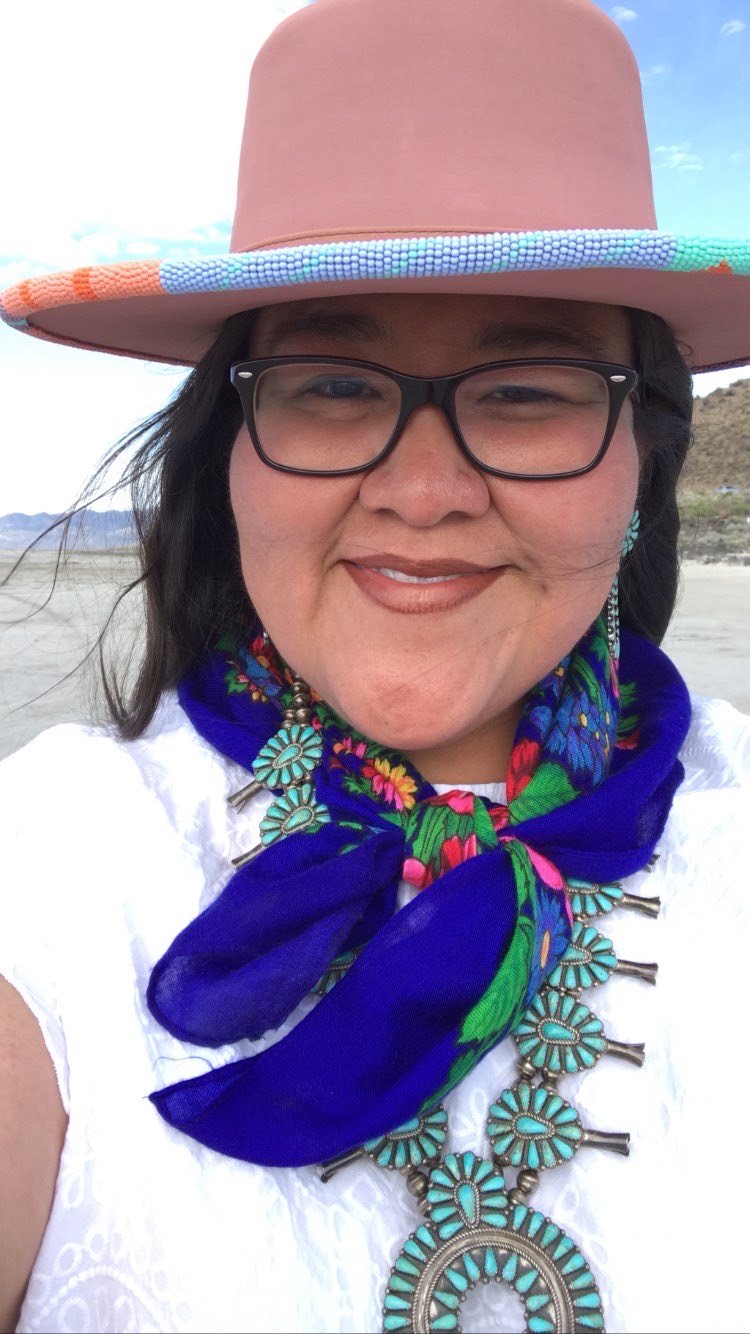Tacey M. Atsitty
The Lady Bug Dish
After Sylvia Plath’s Bee Poems
I don’t know where they came from,
seeped in through windows or doors,
perhaps panes or vents,
or at the hinges.
All I know is they are here
with me, climbing the linen
curtains, and racing
along the molding—
They lean towards going crazy
in flight, like a moth at flame
I fear a nose dive
after their circling
Once one landed on my arm
chair, so I studied its back
some before rounding
my own back like hers.
Was it still too cold outside
for me to flick her away
like I did? Trauma
of drinking nothing
except drops from the mason
jar atop the stone coaster
on my writing desk:
soon I will see them
congregated in the dish
nearest the window, sunlit
exoskeletons
wings opened for flight.
After Emily Dickinson’s “Letter to the World”
This is my letter to the earth
Who never wrote me back—
Perhaps except to say: Mirth,
I meant to give you back
once more & give you more than birth.
You left me hollow inside, here:
a cave mined of worth—
more than a sincere
gesture or gemstone glimmering
from the darkness above— I meant
to be shimmering
during your ascent—
Groundwater
It was the Christmas my sister’s hamsters went missing from their cage. Santa had just brought Kisses and Fatso only two nights prior. The cage was knocked over, but we didn’t put two and two together until her cat Mushy came out of hiding a few hours later. I mean, we weren’t for sure, but we suspected. And my sister just cried. Though we were young, we were no strangers to death. It didn’t help that we were so close to it all the time. Just over the small wall to the east of our house sat a funeral home: Chapel of Memories. The deluge of trucks and cars coming and going from next door and even in front of our house became so common place we hardly noticed it anymore. Someone—we learned—was always grieving. I once snuck past the funeral doors during someone’s family gathering for their dearly departed. I wanted to walk the room with empty coffins. I knew exactly where to go because I had been there a few weeks prior, at my dad’s side, picking out the coffin for my uncle. I was a planner, and I wanted to pick out my own. I sauntered past the high-end ones, not because they were too expensive, but because they simply weren’t me. And they were outdated. At one point, I remember hearing several women howling in the next room over. I knew their grief. Waves stirred and swelled within me. Part of me wanted to join them, but— there it was: a human-sized cedar box with a lacquer so clear it could’ve been hard candy. The coffin had Native designs burned into its sides, but the workmanship on it was just ok. I ran my fingers along the burnt edges, the tips picking up ash— though that coffin most appealed to me because it was lined with Pendleton wool fabric, I decided against it because it was too flashy. So, I went with the plainest of plain wooden boxes. In that one, I knew I’d be lying closest to the earth and all her water.
Kenzie Allen
Crisosto Apache
Tacey M. Atsitty
Kimberly L. Becker
Scott Gonzales Bentley
Kimberly Blaeser
Abigail Chabitnoy
Collestipher D. Chatto
Franklin K.R. Cline
Laura Da’
Aja Couchois Duncan
Max Early
Diane Glancy
Aimee Inglis
Boderra Joe
Joan Naviyuk Kane
Halee Kirkwood
Michaelsun Stonesweat Knapp
Chip Livingston
Manny Loley
Arielle Taitano Lowe
Tyler Mitchell
Ruby Hansen Murray
Kobe T. Natachu
Shaina A. Nez
Margaret Noodin
dg nanouk okpik
Delaney R. Olmo
Elise Paschen
Shantell Powell
Vivian Faith Prescott
Ha’åni Lucia Falo San Nicolas
Jake Skeets
James Thomas Stevens
Lehua M. Taitano
Margo Tamez
Arianne True
Annie Wenstrup

